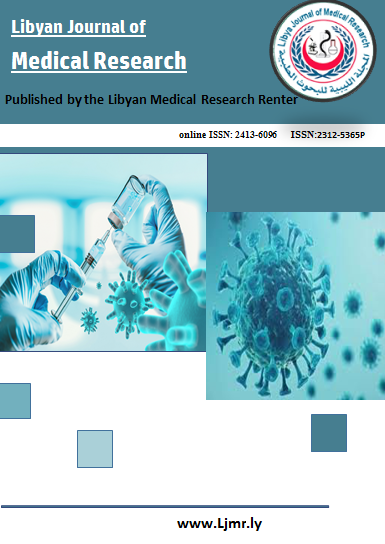Does the ABO blood group associate with peptic ulcer disease?
DOI:
https://doi.org/10.54361/LJMR.19.1.31Keywords:
ABO, , blood group, gastric ulcer, duodenal ulcer, peptic ulcer disease, PUDAbstract
Background: Peptic ulcer disease (PUD) is considered as an important cause of morbidity and mortality worldwide. Numerous studies have linked PUD with the ABO blood groups. However, such studies are lacking in Libya. This study aims to investigate the association between ABO blood groups and patients with PUD, and assess if sex and age are linked to the increased incidence of PUD. Further evaluation of the most prevalent type of peptic ulcer and determining the dominant blood group for each ulcer type are also objectives.
Materials and Methods: This study was conducted at Tripoli University Hospital. A total of 150 Libyan participants were divided into PUD patients (n=75) and controls (n=75). The slide agglutination method was employed for ABO blood grouping. Data were analyzed statistically using IBM SPSS version 26.
Results: Among PUD patients, 48% were between the ages of 16 and 30. 58.7% of patients were females, while 41.3% were males. A significant association between PUD and factors (gender and age) was observed when compared to controls (p<0.05). The distribution of ABO blood groups shows that blood group O is the most prevalent blood group among samples (51% in the PUD and 37% in controls), although was not statistically different (p=0.318). Gastric ulcer incidence was higher (64.0%) compared to duodenal ulcer (36.0%). However, no statistically significant relationship was observed between blood groups and ulcer types.
Conclusion: Although PUD was more common in patients with blood group O, this association was not statistically significant. Both gender and age are likely risk factors for PUD. These findings suggest no correlation between ABO blood group system and PUD.
Downloads
References
1. Lauret, ME., Rodriguez-pelaez, M., Perez, I., & Rodrigo, L. Peptic Ulcer Disease. Austin J Gastroenterol. 2015 Nov;2(5), 1055.
2. Bereda, GJ. Peptic Ulcer disease: Definition, pathophysiology, and treatment. Journal of Biomed. Biol. Sci. 2022 May;1(2), 1–10.
3. Amandeep, K., Robin, S., Sharma, R., & Sunil, K. Peptic ulcer: A review on etiology and pathogenesis. IRJP. 2012 Jun;3(6), 34–38.
4. Kavitt RT, Lipowska AM, Anyane-Yeboa A, Gralnek IM. Diagnosis and Treatment of Peptic Ulcer Disease. Am J Med. 2019 Apr;132(4):447-456.
5. Narayanan M, Reddy KM, Marsicano E. Peptic Ulcer Disease and Helicobacter pylori infection. Mo Med. 2018 May-Jun;115(3):219-224.
6. Yim MH, Kim KH, Lee BJ. The number of household members as a risk factor for peptic ulcer disease. Sci Rep. 2021 Mar 5;11(1):5274.
7. Deding U, Ejlskov L, Grabas MP, Nielsen BJ, Torp-Pedersen C, Bøggild H. Perceived stress as a risk factor for peptic ulcers: a register-based cohort study. BMC Gastroenterol. 2016 Nov 28;16(1):140.
8. Wang YK, Kuo FC, Liu CJ, Wu MC, Shih HY, Wang SS, Wu JY, Kuo CH, Huang YK, Wu DC. Diagnosis of Helicobacter pylori infection: Current options and developments. World J Gastroenterol. 2015 Oct 28;21(40):11221-35.
9. Gudina EK, Amare H, Ali S, Berhane Arefayine M, Tewolde D, Tesfaye Eshete M, Jebena MG, Wieser A, Froeschl G, Tesfaye M, Desalegn H, Gashaw M. Diagnostic Challenges of Helicobacter pylori Infection in Ethiopia: A Community-Based Cross-Sectional Study. Can J Gastroenterol Hepatol. 2022 Jun 2;2022:4013020.
10. Anstee DJ. The relationship between blood groups and disease. Blood. 2010 Jun 10;115(23):4635-43.
11. Abegaz SB. Human ABO Blood Groups and Their Associations with Different Diseases. Biomed Res Int. 2021 Jan 23;2021:6629060.
12. Wang Z, Liu L, Ji J, Zhang J, Yan M, Zhang J, Liu B, Zhu Z, Yu Y. ABO blood group system and gastric cancer: a case-control study and meta-analysis. Int J Mol Sci. 2012 Oct 17;13(10):13308-21.
13. Vu C, Ng YY. Prevalence of Helicobacter pylori in peptic ulcer disease in a Singapore hospital. Singapore Med J. 2000 Oct;41(10):478-81.
14. Peterson WL. Helicobacter pylori and peptic ulcer disease. N Engl J Med. 1991 Apr 11;324(15):1043-8
15. Alzahrani S, Lina TT, Gonzalez J, Pinchuk IV, Beswick EJ, Reyes VE. Effect of Helicobacter pylori on gastric epithelial cells. World J Gastroenterol. 2014 Sep 28;20(36):12767-80.
16. Baj J, Forma A, Sitarz M, Portincasa P, Garruti G, Krasowska D, Maciejewski R. Helicobacter pylori Virulence Factors-Mechanisms of Bacterial Pathogenicity in the Gastric Microenvironment. Cells. 2020 Dec 25;10(1):27.
17. Groot HE, Villegas Sierra LE, Said MA, Lipsic E, Karper JC, van der Harst P. Genetically Determined ABO Blood Group and its Associations With Health and Disease. Arterioscler Thromb Vasc Biol. 2020 Mar;40(3):830-838.
18. Jansen SNG, Kamphorst BA, Mulder BC, van Kamp I, Boekhold S, van den Hazel P, Verweij MF. Ethics of early detection of disease risk factors: A scoping review. BMC Med Ethics. 2024 Mar 5;25(1):25.
19. Teshome Y, Mekonen W, Birhanu Y, Sisay T. The association between ABO blood group distribution and peptic ulcer disease: a cross-sectional study from Ethiopia. J Blood Med. 2019 Jul 4;10:193-197.
20. Almorish MA, Al-Absi B, Elkhalifa AME, Elamin E, Elderdery AY, Alhamidi AH. ABO, Lewis blood group systems and secretory status with H.pylori infection in yemeni dyspeptic patients: a cross- sectional study. BMC Infect Dis. 2023 Aug 8;23(1):520.
21. Edgren G, Hjalgrim H, Rostgaard K, Norda R, Wikman A, Melbye M, Nyrén O. Risk of gastric cancer and peptic ulcers in relation to ABO blood type: a cohort study. Am J Epidemiol. 2010 Dec 1;172(11):1280-5.
22. Alkout AM, Blackwell CC, Weir DM, Poxton IR, Elton RA, Luman W, Palmer K. Isolation of a cell surface component of Helicobacter pylori that binds H type 2, Lewis(a), and Lewis(b) antigens. Gastroenterology. 1997 Apr;112(4):1179-87.
23. Borén T, Falk P, Roth KA, Larson G, Normark S. Attachment of Helicobacter pylori to human gastric epithelium mediated by blood group antigens. Science. 1993 Dec 17;262(5141):1892-5.
24. Almorish MA, Al-Absi B, Elkhalifa AME, Elamin E, Elderdery AY, Alhamidi AH. ABO, Lewis blood group systems and secretory status with H.pylori infection in yemeni dyspeptic patients: a cross- sectional study. BMC Infect Dis. 2023 Aug 8;23(1):520.
25. Alkout AM, Blackwell CC, Weir DM. Increased inflammatory responses of persons of blood group O to Helicobacter pylori. J Infect Dis. 2000 Apr;181(4):1364-9.
26. Abdulridha, MK. The Relationship between ABO Blood Group Distribution and the incidence of Upper Gastric and Duodenal Ulcer in Iraqi Patients. Iraqi J Pharm Sci. 2013 Mar;22(1), 97–103.
27. Peptic ulcer. (2014 Dec 29. Massachusetts):Harvard health publishing; [accessed 2024 Sep 15]. https://www.health.harvard.edu/digestive-health/peptic-ulcer-overview
28. Kurata JH, Haile BM, Elashoff JD. Sex differences in peptic ulcer disease. Gastroenterology. 1985 Jan;88(1 Pt 1):96-100.
29. Eskes T, Haanen C. Why do women live longer than men? Eur J Obstet Gynecol Reprod Biol. 2007 Aug;133(2):126-33.
30. Sharndama HC, Mba IE. Helicobacter pylori: an up-to-date overview on the virulence and pathogenesis mechanisms. Braz J Microbiol. 2022 Mar;53(1):33-50.
Downloads
Published
Issue
Section
License
Copyright (c) 2025 Mahmoud M. Ashawesh, Lina N. Wakhi, Aynour Y. Bizan, Waed A. Mohmes (Author)

This work is licensed under a Creative Commons Attribution-NonCommercial-NoDerivatives 4.0 International License.
Open Access Policy
Libyan journal of medical Research (LJMR).is an open journal, therefore there are no fees required for downloading any publication from the journal website by authors, readers, and institution.
The journal applies the license of CC BY (a Creative Commons Attribution 4.0 International license). This license allows authors to keep ownership f the copyright of their papers. But this license permits any user to download , print out, extract, reuse, archive, and distribute the article, so long as appropriate credit is given to the authors and the source of the work.
The license ensures that the article will be available as widely as possible and that the article can be included in any scientific archive.
Editorial Policy
The publication of an article in a peer reviewed journal is an essential model for Libyan journal of medical Research (LJMR). It is necessary to agree upon standards of expected ethical behavior for all parties involved in the act of publishing: the author, the journal editorial, the peer reviewer and the publisher.
Any manuscript or substantial parts of it, submitted to the journal must not be under consideration by any other journal. In general, the manuscript should not have already been published in any journal or other citable form, although it may have been deposited on a preprint server. Authors are required to ensure that no material submitted as part of a manuscript infringes existing copyrights, or the rights of a third party.
Authorship Policy
The manuscript authorship should be limited to those who have made a significant contribution and intellectual input to the research submitted to the journal, including design, performance, interpretation of the reported study, and writing the manuscript. All those who have made significant contributions should be listed as co-authors.
Others who have participated in certain substantive aspects of the manuscript but without intellectual input should only be recognized in the acknowledgements section of the manuscript. Also, one of the authors should be selected as the corresponding author to communicate with the journal and approve the final version of the manuscript for publication in the LJMR.
Peer-review Policy
- All the manuscripts submitted to LJMR will be subjected to the double-blinded peer-review process;
- The manuscript will be reviewed by two suitable experts in the respective subject area.
- Reports of all the reviewers will be considered while deciding on acceptance/revision or rejection of a manuscript.
- Editor-In-Chief will make the final decision, based on the reviewer’s comments.
- Editor-In-Chief can ask one or more advisory board members for their suggestions upon a manuscript, before making the final decision.
- Associate editor and review editors provide administrative support to maintain the integrity of the peer-review process.
- In case, authors challenge the editor’s negative decision with suitable arguments, the manuscript can be sent to one more reviewer and the final decision will be made based upon his recommendations.














